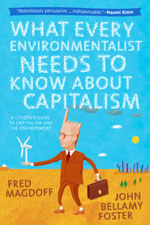Marxism & ecology
Aotearoa/New Zealand: Building an eco-socialist network in New Zealand

Statement by Socialist Worker central committee

August 1, 2011 -- Monthly Review Press has kindly given permission to Links International Journal of Socialist Renewal to publish "The growth imperative of capitalism", an exclusive excerpt from Fred Magdoff and John Bellamy Foster's just released What every environmentalist needs to know about capitalism. You can download the excerpt HERE (PDF), or read it on screen below.
John Bellamy Foster will be a featured international guest at the second World at a Crossroads: Climate Change – Social Change Conference, Friday, September 30 – Monday, October 3, 2011, Melbourne University.
Marxism and ecology: World at a Crossroads conference background readings
July 22, 2011-- Links International Journal of Socialist Renewal/Climate and Capitalism -- The second World at a Crossroads; Climate Change, Social Change conference will be held in Melbourne Australia, September 30-October 3, 2011. Links International Journal of Socialist Renewal is proud to be one of the co-sponsors of the conference and urges all its readers to attend, if at all possible. Click here to register.
The conference aims to contribute towards understanding and collective action, in Australia and internationally, to urgently address the climate and social emergencies that we must overcome if humanity and the planet are to not only survive, but thrive.
Aotearoa/New Zealand: Greed is good, as long as it's green

[Sue Bradford will be a speaker at the World at a Crossroads II: Climate change: social change conference, in Melbourne, Australia, September 30-October 3, 2011.]
By Sue Bradford
Deep ecology versus ecosocialism: A letter on population, wilderness and ecosocialism

"If ecosocialists support wilderness clearances and population reduction they will be on the wrong side of some of the most important struggles in the world today." -- Ian Angus
[Ian Angus will be a feature speaker at the World at a Crossroads II: Climate change: social change conference, in Melbourne, Australia, September 30-October 3, 2011.]
July 4, 2011 -- The following is Climate and Capitalism editor Ian Angus’s response to "Saral Sarkar on Malthusianism and Ecosocialism" and Sarkar’s "Reply to some points made by my critics and sympathizers". It is part of a continuing discussion taking place on Climate and Capitalism (see the links at the end of the article).
* * *
Dear Saral Sarkar,
Deep ecology versus ecosocialism

[Ian Angus will be a feature speaker at the World at a Crossroads II: Climate change: social change conference, in Melbourne, Australia, September 30-October 3, 2011.]
By Ian Angus
June 19, 2011 --This article first appeared at Climate and Capitalism. It is posted at Links International Journal of Socialist Renewal with permission -- Some people believe that deep ecology is not just compatible with ecosocialism, but a way to improve it. That’s a profound misconception that ignores deep ecology’s anti-human core. The following was first posted on the online discussion group that was set up after the founding of the Ecosocialist international Network. I have added some suggestions for further reading.
* * *
জলবায়ু পরিবর্তন : একটি মার্ক্সবাদী বিশ্লেষণ
মূল: টেরি টাউনসেন্ড
ভাষান্তর: হাসান মেহেদী
[Original English version (2007) at http://www.dsp.org.au/node/166. The Democratic Socialist Perspective has now merged with the Socialist Alliance of Australia. This translation into Bangla appeared at Bangladesh's monthly progressive online journal, Shojashapta, on April 14, 2011.]
‘The Ecological Rift’: a radical response to capitalism’s war on the planet

John Bellamy Foster, renowned US economist and ecologist, editor of the US socialist journal Monthly Review and author of The Ecological Rift, The Ecological Revolution, The Great Financial Crisis (with Fred Magdoff), Marx’s Ecology; Ecology Against Capitalism, and The Vulnerable Planet, will be a featured international guest at the second World at a Crossroads: Climate Change – Social Change Conference, Friday, September 30 – Monday, October 3, 2011, Melbourne University.
* * *
Review by Simon Butler
The Ecological Rift: Capitalism’s War on the Earth
John Bellamy Foster, Brett Clark and Richard York
Monthly Review Press, 2010
544 pages
The futility of green capitalism: Interview with Daniel Tanuro
January 17, 2011 -- Climate & Capitalism -- Daniel Tanuro’s new book, L’impossible capitalisme vert,or “The Futility of Green Capitalism”, is a major contribution to our analytical understanding of ecosocialism. Tanuro, a Belgian Marxist and certified agriculturist, is a prolific author on environmental history and policies.
Addressed primarily to the Green milieu, as the title indicates, this book is a powerful refutation of the major proposals advanced to resolve the climate crisis that fail to challenge the profit drive and accumulation dynamic of capital. Much of the book appears to be a substantially expanded update of a report by Tanuro adopted in 2009 by the leadership of the Fourth International as a basis for international discussion. That report was translated by Ian Angus and included in his anthology The Global Fight for Climate Justice.
Capitalism and degrowth: An impossibility theorem

By John Bellamy Foster
January 2011 -- Monthly Review -- In the opening paragraph to his 2009 book, Storms of My Grandchildren, James Hansen, the world’s foremost scientific authority on global warming, declared: “Planet Earth, creation, the world in which civilization developed, the world with climate patterns that we know and stable shorelines, is in imminent peril…The startling conclusion is that continued exploitation of all fossil fuels on Earth threatens not only the other millions of species on the planet but also the survival of humanity itself—and the timetable is shorter than we thought.”1
Fred Magdoff: Creating an ecological civilisation

By Fred Magdoff
``It is inconceivable that capitalism itself will lead directly to an ecological civilization that provides the basic needs for all people. However, building an ecological civilization that is socially just will not automatically happen in post-capitalist societies. It will occur only through the concerted action and constant vigilance of an engaged population.''
January 2011 -- Monthly Review -- Given the overwhelming harm being done to the world’s environment and to its people, it is essential today to consider how we might organize a truly ecological civilization—one that exists in harmony with natural systems—instead of trying to overwhelm and dominate nature. This is not just an ethical issue; it is essential for our survival as a species and the survival of many other species that we reverse the degradation of the earth’s life support systems that once provided dependable climate, clean air, clean water (fresh and ocean), bountiful oceans, and healthy and productive soils.

